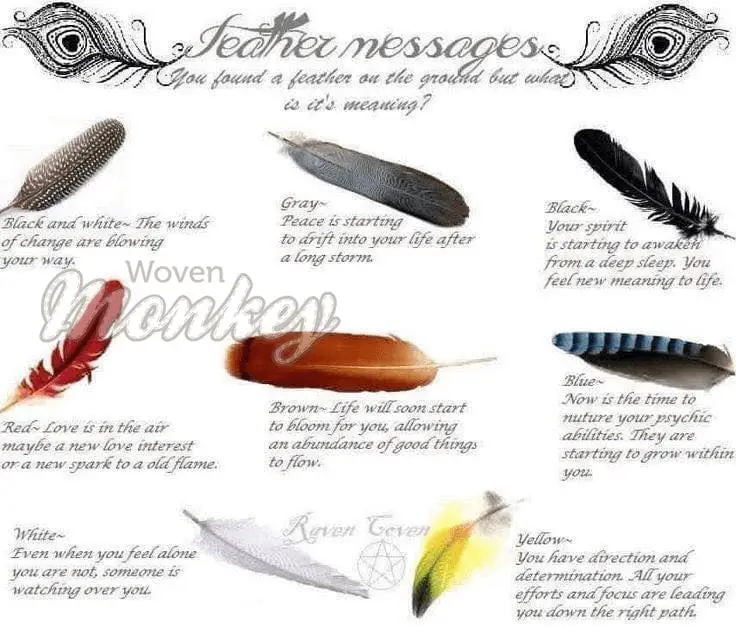Feathers have held cultural and spiritual significance for Native Americans for thousands of years. They use feathers in rituals, ceremonies, and everyday life to connect with and honor the natural and spiritual worlds. Feathers symbolize transcendence, flight, freedom, honor, strength, wisdom and more. Different feathers can convey different meanings and messages.
Spiritual Meaning
In many Native American traditions, feathers represent a connection to the Creator and the spirit world. They are seen as gifts from the divine and allow the wearer to transcend the physical world and connect with the spiritual. Specific colors, patterns, and types of feathers impart different spiritual attributes.
Eagle feathers are one of the most revered. They symbolize honor, bravery, love, strength and wisdom. They are seen as a connection between earth and sky, and a representation of divine power. Owning or wearing an eagle feather bestows spiritual protection and connection. Other highly symbolic feathers include hawk, peacock, turkey, goose and raven.
Feathers worn during rituals or ceremonies establish a link between the wearer and divinity. They allow prayers, gratitude and intentions to be carried between worlds. Many tribes believe that when feathers are raised to the sky during dance or prayer, the Creator is better able to hear their voices.
Cultural Significance
Beyond spiritual meaning, feathers signify cultural values like honor, bravery, and connection to tribe. They are worn and displayed with great respect and pride.
Warriors who demonstrated exceptional courage and skill in battle earned the right to wear certain feathers, especially eagle feathers, as a sign of their heroic deeds. Chiefs and other eminent tribe members were also gifted feathers in honor of their rank, wisdom and contributions to their people.
Feathers are commonly worn in the hair or on traditional regalia during ceremonies, dances and powwows. Their colors and patterns identify the dancer’s tribe and convey information about their family and status within the community.
Gifting and exchanging feathers is a sign of honor, respect and connection. When a feather is gifted, it establishes a bond between the giver and receiver. The feather is imbued with the giver’s blessings and energy.
Feather Symbolism by Type
Different feathers have different symbolic meanings:
| Feather | Meaning |
|---|---|
| Eagle | Spirit, honor, bravery, wisdom, power |
| Owl | Wisdom, transition, messages, stealth |
| Hawk | Clear vision, strong leadership, illumination |
| Peacock | Renewal, self-expression, wholeness |
| Turkey | Abundance, pride, fertility |
| Goose | Determination, communication, teamwork |
| Raven | Insight, playfulness, transformation |
Feather Colors
The color of a feather also impacts its meaning:
| Color | Meaning |
|---|---|
| White | Purification, spirituality, wisdom |
| Black | Protection, mysticism, banishing negativity |
| Red | Vitality, strength, passion |
| Yellow | Joy, intellect |
| Blue | Peace, harmony |
| Green | Growth, healing |
| Brown | Stability, earthiness |
| Gray | Neutrality, balance |
Significance in Tribal Life
Feathers feature prominently in Native American life:
- Given as tokens of honor and appreciation
- Worn in hair and clothing for ceremonies and rituals
- Used in fans, pipes, staffs, and more
- Decorate homes, altars and sacred spaces
- Hung above infant cradleboards for protection
- Attached to prayer sticks and offerings
- Used in traditional dance regalia and costumes
- Featured in stories, myths and oral histories
- Incorporated into tribal flags and insignia
- Used in healing practices and rituals
When eagle feathers are gifted, it is considered one of the highest honors. They are signs of great respect and carry heavy spiritual meaning. The feathers must be accepted with humility, reciprocated appropriately, and cared for conscientiously.
Significance of Owning Feathers
For Native Americans, owning certain feathers, especially eagle feathers, is a sacred privilege. Their possession comes with great responsibility.
Those gifted with feathers believe it is their duty to use them for good – to promote community, harmony and spirituality. They do not view their feathers as material objects to be displayed like trophies. They see themselves as temporary custodians who must care for the feathers and respect their significance.
When not being used for ceremonial purposes, feathers are often wrapped in cloth or kept in specialcontainers. This protects and honors them. Many see each feather as its own living entity deserving of reverence.
Modern Feather Etiquette
Native American feather culture remains vital today. There is an unwritten etiquette around how to respectfully integrate feathers into modern life:
- If gifted a feather, offer heartfelt thanks and find an honorable way to reciprocate
- Only accept feathers you feel ready for the responsibility of caring for
- Never buy or sell sacred feathers
- Don’t flaunt feathers or use as costume pieces
- Don’t stick feathers in your hair just for style – earn them
- Don’t litter the ground with fallen feathers
- Ask permission before using feathers in art or writing
- Don’t mix feathers with inappropriate dress or decor
- Dispose of un-needed feathers respectfully, usually by burning
Non-Natives should educate themselves on feather meanings and treat feathers with deference when encountering them. Many tribes encourage respectful awareness, but not cultural appropriation.
Legal Protections
Because of their cultural importance, Native American feathers are legally protected in the United States. The Migratory Bird Treaty Act and the Bald and Golden Eagle Protection Act limit sale and ownership. Only enrolled members of federally-recognized tribes may legally possess certain feathers, like those from eagles and migratory birds.
Conclusion
Feathers carry deep spiritual and cultural symbolism for Native Americans. They signify values like bravery, wisdom, freedom and connection to the Creator. Different feathers impart different meanings and responsibilities. Many tribes see caring for feathers as an honor and lifelong duty. The legacy of feathers links today’s Native Americans closely to their ancestors and the natural and spiritual worlds.


